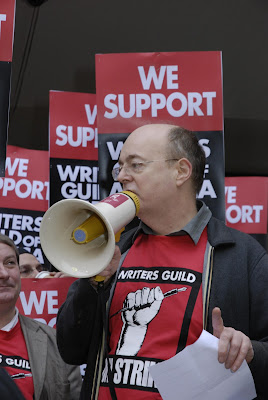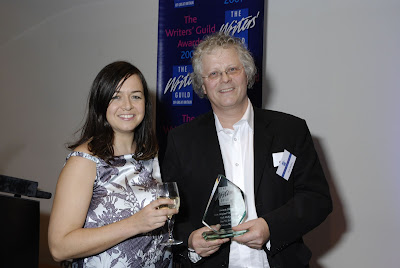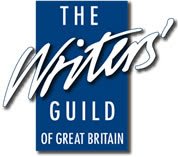An official statement from the WGGBThe Writers’ Guild of Great Britain pledges support to colleagues in the Writers Guild of America who have voted to go on strike.
We call on our members – and all UK writers – to refuse to break the strike by filling in for US writers in dispute. WGGB General Secretary Bernie Corbett said: “Strikebreaking would at best bring a short-term payday, but would have a devastating long-term effect on a writers’ US career.”
The 12,000 members of the Writers Guild of America are striking to get better payments when the shows they write are re-sold as DVDs, internet downloads and mobile phone transmissions. Weeks of talks with representatives of US TV networks and film studios broke down earlier this week.
Last night nearly 3,000 WGA members packed the Los Angeles Convention Center. At this meeting, the largest membership meeting in WGA history, writers expressed their anger at the companies’ refusal to bargain seriously.
Under UK trade union laws the WGGB cannot issue a strike instruction, nor can it discipline any members who defy the strike, however the WGGB points out the serious implications of the WGA strike rules.
Rule 13 of the WGA Strike Rules states: “The Guild does not have the authority to discipline non members for strike breaking and/or scab writing. However, the Guild can and will bar that writer from future Guild membership. This policy has been strictly enforced in the past and has resulted in convincing many would be strike breakers to refrain from seriously harming the Guild and its members during a strike.”
Without WGA membership, it is virtually impossible for a writer to work for the main networks and studios in the USA.
The Writers’ Guild of Great Britain recalls that during the last WGA strike in 1988, there was solid support by UK writers, with very few cases of strikebreaking. We expect the same to be the case this time round as well.
At the time of writing it was not known when the strike would officially begin. It follows a 90 per cent vote by members in favour of action. The TV networks and film studios, represented by the Association of Motion Picture and Television Producers (AMPTP) have refused to budge from their existing DVD deal, which pays the writer a mere 4 cents on each $15 DVD, and would extend the same minimal terms to internet downloads and mobile phone viewing.
The Writers’ Guild of Great Britain, along with writers’ guilds in Canada, Australia, New Zealand, Ireland, South Africa and other countries, is a signatory to the “Auckland Declaration”, signed in 2000, which states:
“To the greatest extent permitted by contract and law, the guilds pledge to honor work stoppages, publicize information about work stoppages to their repective memberships, and to lend all aid possible to each other in support of negotiating goals.”
Corbett said: “This means we strongly advise our members not to engage in strikebreaking, and on top of that if we learn of any cases of strikebreaking either by WGGB members or non-members, we will not hesitate to inform the WGA so that they can follow it up according to their rules.
“As it happens the Writers’ Guild of Great Britain has been able to negotiate satisfactory terms with UK broadcasters covering DVDs, internet downloads, mobile phones, etc. It is right that we should support our American colleagues as they fight to achieve the same kind of terms.
“We are contacting the major UK broadcasters and producers, and the UK Film Council, asking them not to dump UK material into the US market, and not to dress up American projects to look as though they are British. Any such manoeuvres would bring at best a short-term advantage, whereas the adverse consequences could last for years.
“Last time the WGA went on strike, in 1988, it lasted five months and for all that time WGGB members kept up their support. We are sure that this time our members will show the same discipline and solidarity. In a global industry, it is in our interests as well as theirs.”
The WGGB will keep members informed about the progress of the WGA strike by emails and postings on our website. Members can also get information by checking
www.wga.org or
www.wgaeast.org. WGGB members with individual queries should contact the Guild on 020 7833 0777 or email
admin@writersguild.org.ukUpdate (05.11.07): The strike
has now started.
























